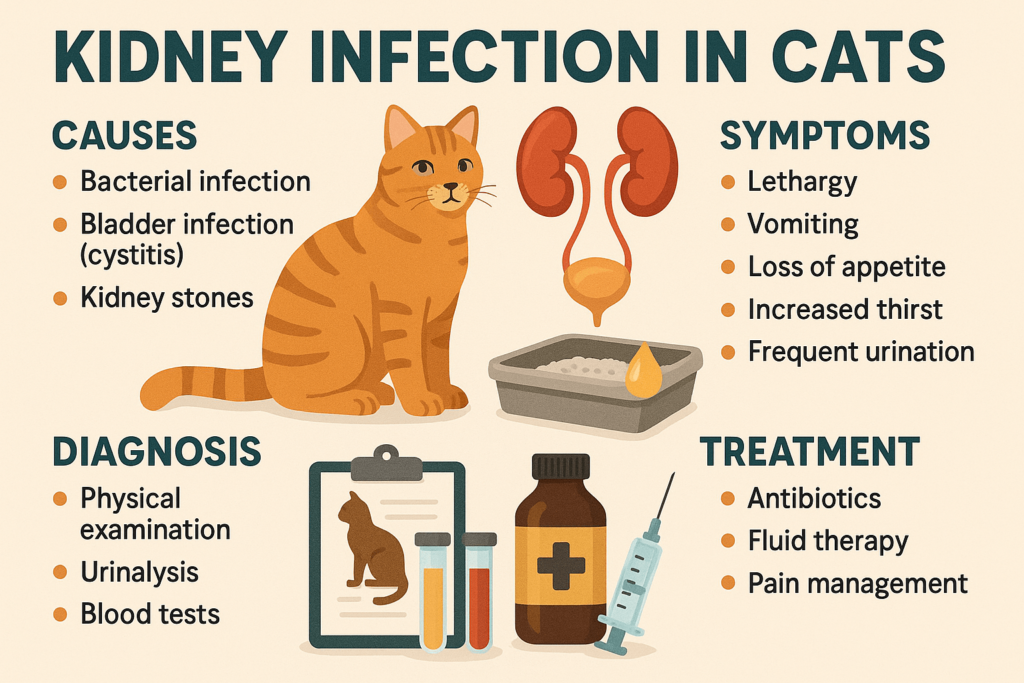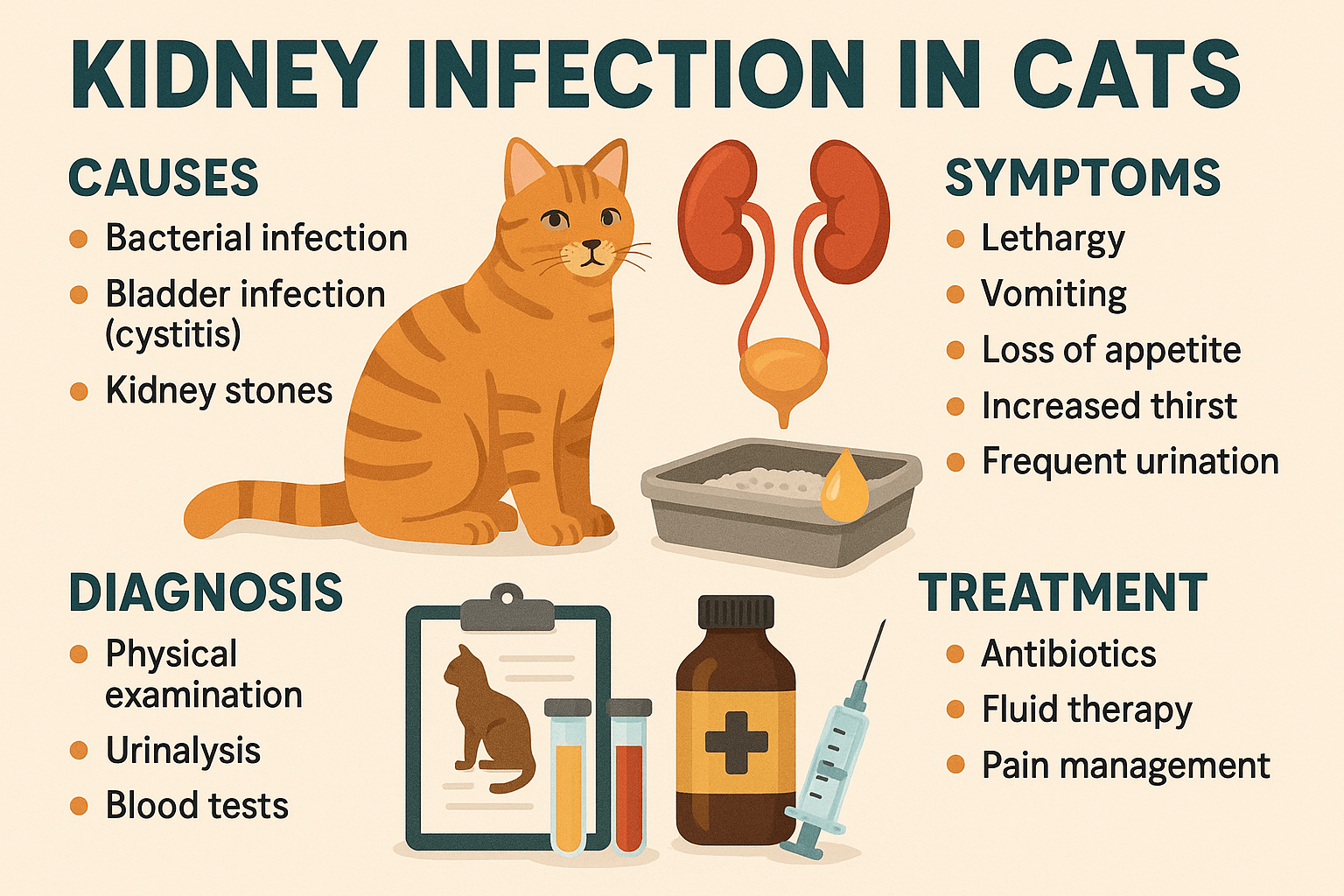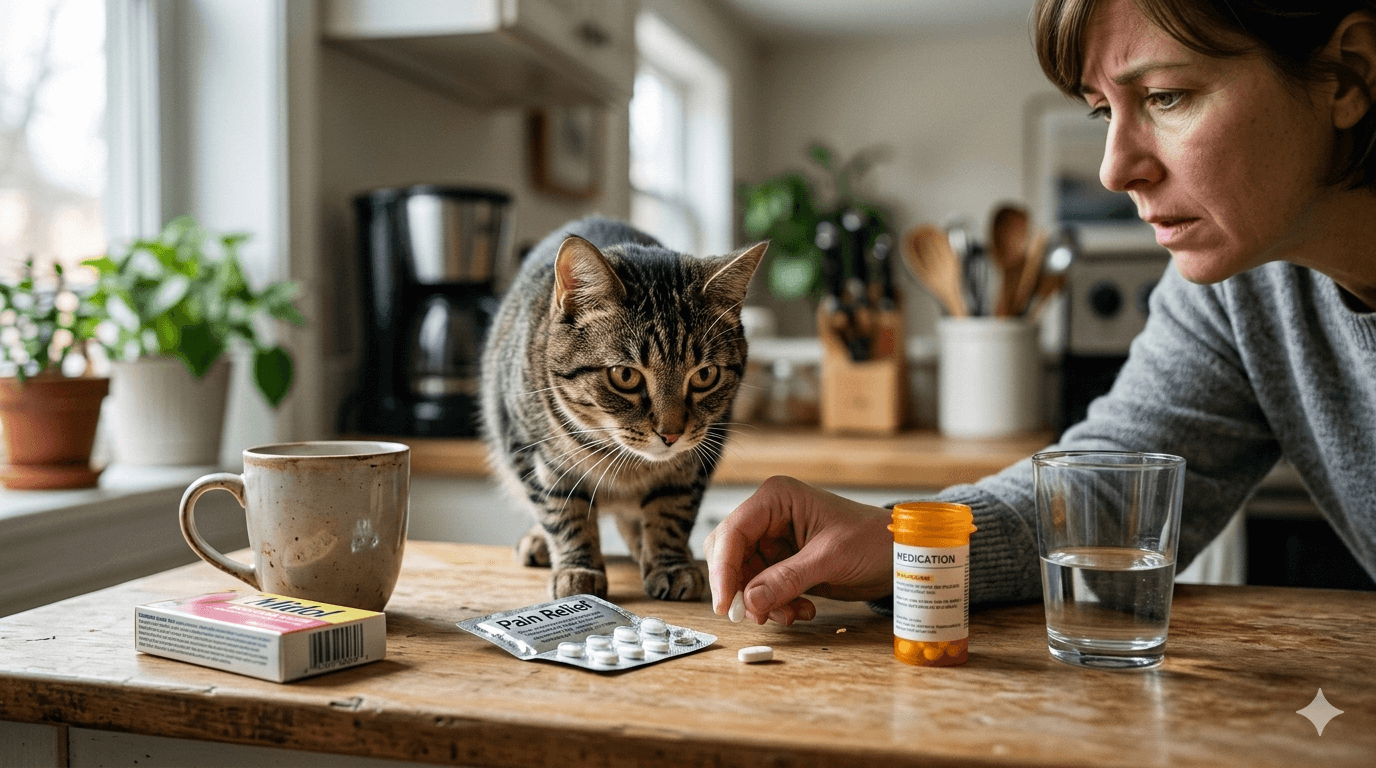Kidney Infection in Cats: What Every Cat Owner Should Know
Kidney infections, also known as pyelonephritis, are a serious health concern for cats and can significantly impact their quality of life. These infections occur when bacteria invade the kidneys, leading to inflammation and potential damage. While kidney issues are more common in older cats, they can affect felines of any age, making it crucial for pet owners to recognize the signs early. Understanding the causes, symptoms, and treatment options for kidney infections empowers you to provide the best care for your furry companion. Let’s explore everything you need to know about this condition and how to keep your cat healthy and happy.
Signs Your Cat May Have a Kidney Infection
Detecting a kidney infection early is vital for effective treatment. Cats are masters at hiding illness, so subtle changes in behavior or appearance may indicate an underlying issue. Here are some common signs to watch for.
Increased Thirst and Urination:
Cats with kidney infections often drink more water than usual and urinate frequently due to impaired kidney function.Lethargy and Weakness:
A lack of energy or reluctance to engage in normal activities can signal discomfort or illness.Loss of Appetite:
Cats may refuse food or show disinterest in treats, which can lead to weight loss over time.Vomiting or Diarrhea:
Gastrointestinal upset, including vomiting or loose stools, may accompany a kidney infection.Bad Breath or Mouth Ulcers:
Foul-smelling breath or sores in the mouth can result from toxins building up in the bloodstream.
If you notice any of these symptoms, consult your veterinarian promptly to determine the cause and begin appropriate treatment.

Causes of Kidney Infections in Cats
Understanding the root causes of kidney infections can help prevent them and ensure timely intervention. Several factors contribute to this condition, ranging from infections to underlying health issues.
Bacterial Infections:
Bacteria traveling from the bladder or urinary tract can ascend to the kidneys, causing infection.Urinary Tract Obstructions:
Blockages in the urinary tract can trap bacteria, increasing the risk of kidney involvement.Underlying Health Conditions:
Chronic kidney disease or diabetes can weaken the immune system, making cats more susceptible to infections.Age-Related Decline:
Older cats are at higher risk due to reduced kidney function and declining immune response.Environmental Stressors:
Stressful situations, such as changes in routine or environment, can lower a cat’s resistance to illness.
By addressing these potential causes, you can take proactive steps to protect your cat’s kidney health.
Check this guide 👉Cat Kidney Stone Treatment: Best 7 Expert Tips!
Check this guide 👉Cat Kidney Stone Symptoms: Best 7 Expert Tips!
Check this guide 👉Understanding Kidney Stones in Cat Urine: Best 7 Tips!
Symptoms of Kidney Infection | Preventive Measures |
|---|---|
Increased thirst and urination | Provide fresh, clean water daily |
Lethargy and weakness | Maintain a stress-free environment |
Loss of appetite | Feed a balanced, high-quality diet |
Vomiting or diarrhea | Schedule regular vet check-ups |
Bad breath or mouth ulcers | Monitor for urinary tract issues |
Treatment Options for Kidney Infections
Treating a kidney infection in cats requires a tailored approach based on the severity of the condition and the cat’s overall health. Here are some common treatment strategies your veterinarian may recommend.
Antibiotics:
Prescribed antibiotics target the bacterial infection and are typically administered for several weeks.Fluid Therapy:
Intravenous or subcutaneous fluids help flush toxins from the kidneys and restore hydration.Pain Management:
Medications may be prescribed to alleviate discomfort and improve your cat’s quality of life.Dietary Adjustments:
Specialized diets low in phosphorus and protein can reduce strain on the kidneys.Follow-Up Monitoring:
Regular check-ups and blood tests ensure the infection is resolving and the kidneys are functioning properly.
With proper treatment and care, many cats recover well from kidney infections and regain their vitality.
How to Support Your Cat During Recovery
Recovery from a kidney infection requires patience and dedication. Supporting your cat during this time can speed healing and enhance their comfort.
Provide a Quiet Space:
Create a calm, quiet area where your cat can rest without disturbances.Encourage Hydration:
Offer water in multiple locations or consider a cat water fountain to encourage drinking.Monitor Eating Habits:
Ensure your cat is eating regularly and offer small, frequent meals if needed.Limit Physical Activity:
Restrict strenuous play or exercise to allow your cat’s body to focus on healing.Administer Medications as Directed:
Follow your vet’s instructions carefully to ensure medications are given correctly and consistently.
By prioritizing your cat’s needs during recovery, you can help them regain strength and return to their playful self.
Risk Factors for Kidney Infections
Certain factors can increase a cat’s risk of developing a kidney infection. Being aware of these risks allows you to take preventive action and minimize potential threats.
Older Age:
Senior cats are more vulnerable due to age-related decline in kidney function.Chronic Illnesses:
Conditions like diabetes or hyperthyroidism can compromise kidney health.Poor Hydration:
Cats that don’t drink enough water are at higher risk of urinary tract issues.Indoor vs. Outdoor Lifestyle:
Outdoor cats may encounter environmental hazards that increase infection risk.Genetic Predisposition:
Some breeds have a higher likelihood of developing kidney-related problems.
Understanding these risk factors helps you tailor care to your cat’s specific needs.
Preventive Care Tips
Prevention is always better than cure when it comes to kidney infections. Incorporating these tips into your routine can reduce your cat’s risk of developing this condition.
Schedule Annual Vet Visits:
Regular check-ups catch potential issues early before they escalate.Maintain Proper Hydration:
Encourage water consumption through wet food or water fountains.Keep Litter Boxes Clean:
A clean litter box reduces the risk of urinary tract infections that could spread to the kidneys.Minimize Stress:
Avoid sudden changes in your cat’s environment to keep their immune system strong.Provide Enrichment:
Mental and physical stimulation supports overall health and resilience.
Proactive care ensures your cat stays healthy and happy for years to come.
When to Seek Emergency Care
Some symptoms of kidney infections require immediate veterinary attention. Knowing when to act quickly can save your cat’s life.
Severe Lethargy:
If your cat is unable to move or respond normally, seek help immediately.Persistent Vomiting:
Continuous vomiting can lead to dehydration and worsening kidney function.Blood in Urine:
This is a red flag indicating a serious underlying issue.Difficulty Breathing:
Labored breathing may signal advanced complications requiring urgent care.Sudden Collapse:
Any sudden collapse or seizures warrants an emergency visit.
Recognizing these warning signs ensures timely intervention and peace of mind.
Frequently Asked Questions About Kidney Infections in Cats
Can a kidney infection be cured?
Yes, with prompt treatment, most cats recover fully, though chronic cases may require ongoing management.
How long does treatment take?
Treatment typically lasts several weeks, depending on the severity of the infection and the cat’s response.
What happens if a kidney infection is left untreated?
Untreated infections can lead to permanent kidney damage, systemic illness, or even death.
Are certain breeds more prone to kidney issues?
Untreated infections can lead to permanent kidney damage, systemic illness, or even death.
Can diet prevent kidney infections?
A balanced diet and proper hydration can support kidney health but cannot guarantee prevention entirely.
Prioritizing Your Cat’s Kidney Health
Kidney infections in cats are a serious but manageable condition when detected early and treated appropriately. By staying vigilant for symptoms, addressing potential causes, and providing supportive care, you can safeguard your cat’s well-being and strengthen the bond you share. Remember, your veterinarian is your greatest ally in navigating this challenge—don’t hesitate to reach out with questions or concerns. With love, attention, and proactive care, your feline friend can enjoy a long, healthy life free from the burden of kidney-related issues.
Can I Give My Cat Midol? Best 7 Expert Tips! – Learn the risks, symptoms, and safe alternatives to keep your cat healthy and avoid toxic reactions.
Can I Give My Dog Midol? Best 7 Expert Tips! – Discover the risks, safe alternatives, and expert advice to keep your dog safe from accidental poisoning.
Maximum Weight for Cats on Planes: Best 7 Expert Tips! – Learn airline policies, tips to stay compliant, and ensure safe travels for your feline friend.
Max Weight for Dogs on Planes: Best 7 Expert Tips! – Discover airline weight limits, safe travel tips, and solutions for flying with your dog stress-free.





